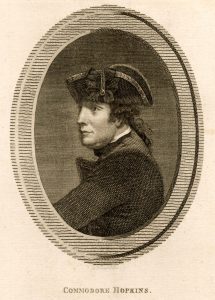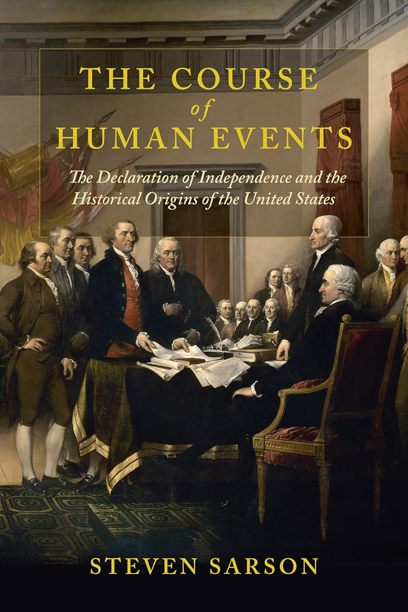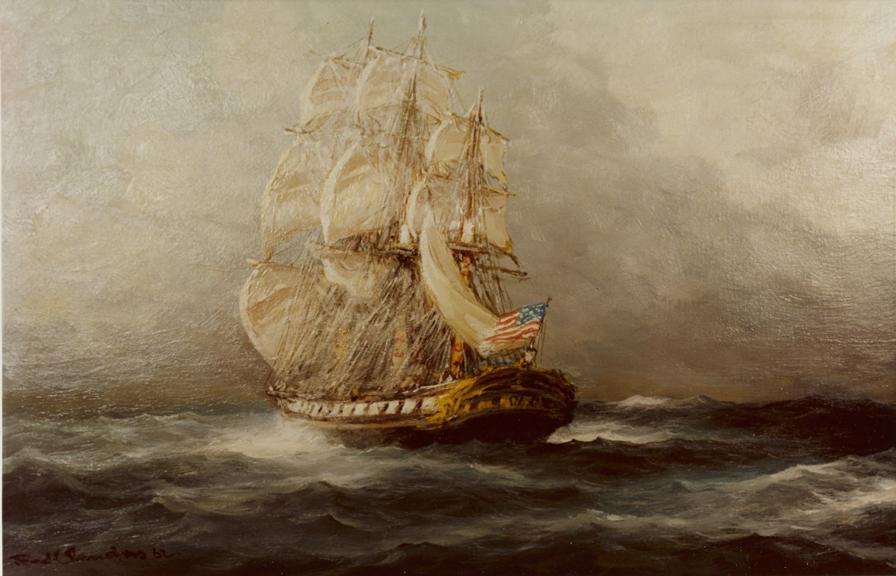The so called “whistleblower law” had a salty source. It did not emanate from the shrill sound of a boatswain’s pipe, but rather a Revolutionary War naval episode.[1] Its origin can be traced to the Continental Congress’s 1775 appointment of Esek Hopkins, formerly a merchantman and privateer, as commander-in-chief of the Continental Navy. As a naval commodore, he formed and led a fleet of eight small merchant ships that had been reconfigured into warships: the Alfred, Andrea Doria, Cabot, Columbus, Providence, Hornet, and Wasp.[2] Hopkins sailed his task force south on February 17, 1776 to New Providence (Nassau) in the Bahamas whose fort was deemed vulnerable and poorly guarded. The commodore planned to capture the fort to furnish badly needed arms, gunpowder and other supplies for the Continental Army and, at the same time, as a show the force of the nascent Continental Navy.
The Hopkins raid on New Providence took place on March 3. It was the first amphibious landing of American marines and sailors that successfully captured munitions. “The town & fort surrendered to us with the ships & vessels in the harbor, without making any resistance we secured all the cannon, Morter shells etc., that was there and left the island. On return we had bad weather.”[3] The diminutive fleet returned to New London, Connecticut on April 8 and, during their return trip, made prizes of two British merchantmen and a six-gun schooner. Unfortunately, on April 6, they failed to capture HMS Glasgow, although they severely damaged her. Attacking the British on their territory became an American naval tactic employed by Captains John Paul Jones, Gustavus Conyngham and Lambert Wickes.

The Continental Congress shortly thereafter decided to supplement their new navy with a fleet of privateers, letter of marque vessels under private commanders. They were relatively successful in capturing British shipping, especially in or near North American waters. This proved to be a lucrative enterprise for the colonial seamen. The downside was that it also made it very difficult to recruit sailors for Hopkins’ navy where the combat was usually more onerous and delivered less appealing monetary rewards. The commander-in-chief spent the next year or so fighting a vastly superior naval force with few triumphs and many failures. As a result, he threatened to resign his commission. When asked to continue, he gradually morph into a sadistic martinet. Discontent emerged among his men that subsequently would have legal repercussions echoing throughout American history.
On February 11, 1777 ten officers and men of the Continental frigate Warren sent a letter to Robert Treat Paine, Massachusetts delegate to the second Continental Congress, proclaiming their fidelity to the American cause. In their letter they also asked for his advice in light of “our present perplexed unhappy situation.” This letter continued in a more formal manner:
Accusations against commodore Hop[kin]s
First, he is a man that ridecules religion, and Seemes very apparently to despise every virtue: he does not hesitate to blaspheme and take the name of God in vain: in this respect he Sets his officers and men a most irreligious and impious example, and when on board, is oftener guilty of profane Swearing than any Jack Tar that belongs to the Ship.
Secondly, he allowes himself to Speak publickly in the most profane and disrespectful manner concerning the continental congress, the guardians of our rights and priviledges, calling them a pack of damn’d fools, ignorant fellows, lawyers darks &c, a company of men wholly unacquainted with mankind, and perfectly unacquainted with their business, and that if their measures were complied with the country would be undone this he asserted not only among our own folks, but also in the presence of two captains, who were prisoners, on their passage to newport in order to be exchanged.
Thirdly, he is a man, if possessed of any principles at all, possessed of the most dangerous principles conceivable, especially when we consider his Station, for he positively declares that all mankind are exactly alike: that no Man yet ever existed who could not be bought with money; who could not be hired with money to do any action whatsoever: this he also asserted in the presence of the above mentioned prisoners, for what reason we can’t determine, unless he meant to inform Sr peter Par[ke]r that he wanted an opportunity in order to Sell himself.
Fourthly, he has treated prisoners in the most inhuman and barbarous manner.
Fifthly when a british frigate, a few days ago, was on ground, either for the want of wisdom, or designedly he conducted in a very blamable manner indeed—
Sixthly, he i[s an] effectual obsticle to the fleets being properly maned, and perhaps, on that very account, in his present Station, does his country more damage than he possibly could do in any other capacity.
Many more very criminal things might be alledged and easily proved but the present opportunity will not Suffer us to be very particular.[4]
The letter continued with similar accusations against the commodore’s son John B. Hopkins, then captain of the Continental warship Warren. The letter was signed by Lieutenants Richard Marvin and James Sellers, three marine officers, the sailing master, the ship’s chaplain, and three others. Although unaware of the petition filed by his officers, Hopkins was cognizant of the loss of confidence in him by the Marine Committee. He wrote a letter on February 14 giving the status of the various ships under his command, saying that “I desire no Command further than you Approve off—and whenever you think my Command is of no service to the Publick, I will not only agree, but in Justice to the Publick think you Should give the Command to some man that can do more for the Public Benefit.”[5]
Paine apparently advised the conspirators to send their complaints to the Marine Committee and to limit their remarks only to the commodore’s conduct.[6] Without authorization, Captain of Marines John Grannis left the Warren on February 19 and traveled to Philadelphia with a petition signed by the same officers.
Hopkins’s days as the Continental Navy’s commander-in-chief became numbered. The Marine Committee heard Grannis reiterate the complaints that he and others had brought to them in their papers.[7] Subsequently on March 26 the committee laid the charges before the Continental Congress. The next day, a resolution was passed “That Esek Hopkins be immediately, and he hereby is, suspended from his command in the American Navy.”[8] On March 29 John Hancock, President of the Continental Congress, wrote, “I have it in Charge from Congress to transmit the above Resolve, which is so explicit that I shall not enlarge any further than to direct, that you do not after receipt hereof in any way whatever exercise an Act of Authority or Command over any of the Vessels belonging to or in the Service of the United States of America.”[9]
Hopkins was indignant over his treatment. He was unaware of the charges that were made against him in the petition and had no hearing or trial. Communications were slow and compounded by the fact that Hopkins spent a great deal of time at sea. Finally, he received a copy of the papers that had been taken to Philadelphia in the fall. Hopkins discovered that the third lieutenant of the Warren, Richard Marvin, was among the signers of the petition and probably the chief conspirator onboard that ship. Hopkins ordered Marvin and Samuel Shaw be tried by a court-martial. Abraham Whipple presided over the trial, a fellow Rhode Islander as were several other jury members. The plaintiffs stated that they had been arrested for doing what they believed was their right to draft a remonstrance.[10] The court-martial board, however, convicted Marvin of signing unjust and false complaints and he was ordered to give up his commission.[11] This court-martial was held on April 3 before the news of Hopkins’s suspension on March 26 had reach the commander-in-chief.
The sentence of suspension remained in force until January 2, 1778, when the following entry was made in the journals of the Continental Congress: “Congress having no further occasion for the service of Esek Hopkins, Esq. who, on the 22 December 1775, was appointed commander-in-chief of the fleet fitted out by the Naval Committee. Resolved, That Esek Hopkins, Esq., be dismissed from the service of United States.”[12] This decision had significant consequence; the title of Commander-in-Chief of the Fleet was never again conferred upon any other naval officer.[13]
Immediately after his dismissal, Hopkins attempted to prove his innocence of the charges and brought a libel suit against the allegations in the document asking for damages of £10,000.
Samuel Shaw and Richard Marvin were the only original plaintiffs that they were able to find. During the trial that lasted five days, Congress furnished the defendants with copies of all relevant acts that referred to the career of Captain Hopkins. Hopkins brought many influential men before the court who had known him for a long time and testified in regard to his character. It was impossible, however, to prove that the signers of the petition “did wickedly and maliciously” conspired together “to injure Hopkins’s reputation.”[14] In response to their petition for help in defending suit, Congress resolved on July 30, 1778 that it was “the duty of all persons in The service of the United States, as well as all other the inhabitants thereof, to give the earliest information to Congress or other proper Authority of any misconduct, frauds, or misdemeanors committed by any officers or persons in the service of the states, which may come to their knowledge.” “Resolved, That the reasonable expenses of defending the said suit be defrayed by the United States.”[15] The jurors doubtlessly realized that the defendants had the support of Congress and, as noted in the resolution, the decision was for the defendants and their costs.Congress, on May 22, 1779, provided $1,418 to cover costs associated with the whistleblowers’ defense. Samuel Adams, delegate to the Continental Congress from Massachusetts, was directed to ensure that their Rhode Island lawyer, William Channing, was paid.
Executions related to disobedience and grievances permeated the British Navy for many years. Justifiable complaints led to mutinies and dire consequences on HMS Culloden (eight hanged), HMS Defiance (eleven hanged) and those that took part in the so called “Revolution at Spithead” (twenty-nine hanged). They became pretexts for multiple reforms, but those were very slow in coming.[16] In contrast, because of a unique Revolutionary War legal incident, the American government provided for citizen dissent without recriminations, a concept that has resonated for over two hundred and forty years. This is an assurance even though some people may be reluctant to do so because of the untoward consequences that could befall them.
On September 25, 1789, the Continental Congress transmitted a Bill of Rights to the nascent states for their approval and these ten amendments were adopted on December 15, 1791. The First Amendment guaranteed freedom of speech. The Civil Service Reform Act of 1978, however,was the first federal law that formally codified whistleblower rights and protections. This was followed in 1989 by the Whistleblower Protection Act to “strengthen and improve protection for the rights of federal employees, to prevent reprisals, and to help eliminate wrongdoing within the Government,” and clarified the procedure by which employees could report fraud, misconduct and wrongdoing sheltered from workplace retaliation. It also separated the agencies representing whistleblowers matters. But these important Acts had their genesis from humble seamen who served in the Continental Navy during the Revolutionary War.
[1]Because of the recent impeachment episode, I became curious about the law and came across several references to the Revolutionary War’s maritime origin of the legislation. After writing this article, I learned the Atlantic magazine has also discussed the topic in an adaptation from a book on the history of whistleblowers in America, which readers might find of interest.
[2]Among his officers were several who gained Revolutionary War notoriety: John Paul Jones, Dudley Saltonstall, Nicholas Biddle, John Hopkins, John Hazard, Abraham Whipple and the then Masters Mate, Joshua Barney.
[3]William B. Clark et al., eds. Naval Documents of the American Revolution, 13 volumes (Washington, DC: Government Printing Office, 1964-2019), 4: 598 (NDAR).
[6]This was not a mutiny, a revolt or insurrection, but the filing of a legal grievance to and through the chain of command.
[10]Sheldon S. Cohen, Commodore Abraham Whipple of the Continental Navy (Gainesville, FL: University of Florida Press, 2010), 74.
[13]The five-star Fleet Admirals of World War II and now the Chief of Naval Operations are approximately the more modern equivalent titles.
[16]Stephen Taylor, Sons of the Waves (New Haven, CT: Yale University Press, 2010), 222-294.









One thought on “The Revolutionary War Origin of the Whistleblower Law”
The account of allegations against Hopkins is interesting, but is it the first instance of a “whistleblower”? According to a 2013 JAR article, that title belongs to Franklin in 1772: https://allthingsliberty.com/2013/12/benjamin-franklin-americas-first-whistleblower/
But, then again, if we are talking solely about a law involving whistleblowers in this confined time period. then the CC’s resolution appears partly accurate. Since it is a concept similar to common law qui tam actions that had a long history centuries before the Rev War, it seems difficult to separate out a specific cause of action and actually call it a “whistleblower law.” The circumstances in Hopkin’s case smell of both qui tam and whistleblower; albeit, the officers were not seeking a portion of any qui tam recovery, but, rather, the cost of their defense. A discussion that included qui tam would have been of added interest to flesh this out.
As far as the term “whisteblower” goes, that seems to be a nineteenth-century invention and not used in the Rev War time period.